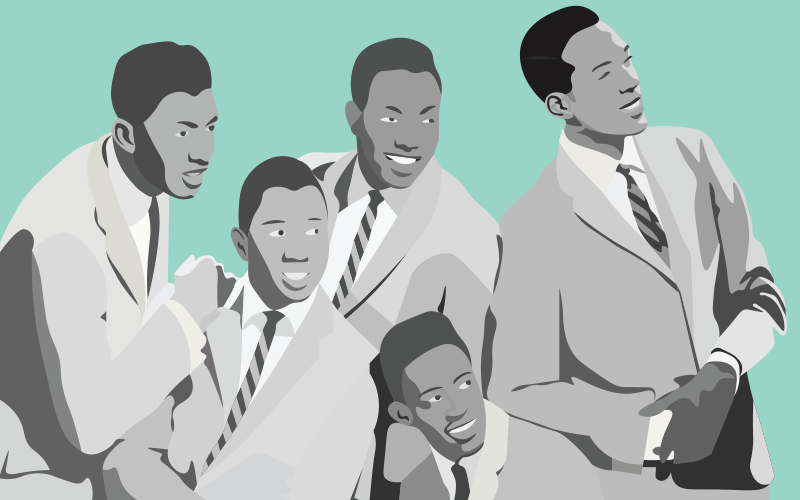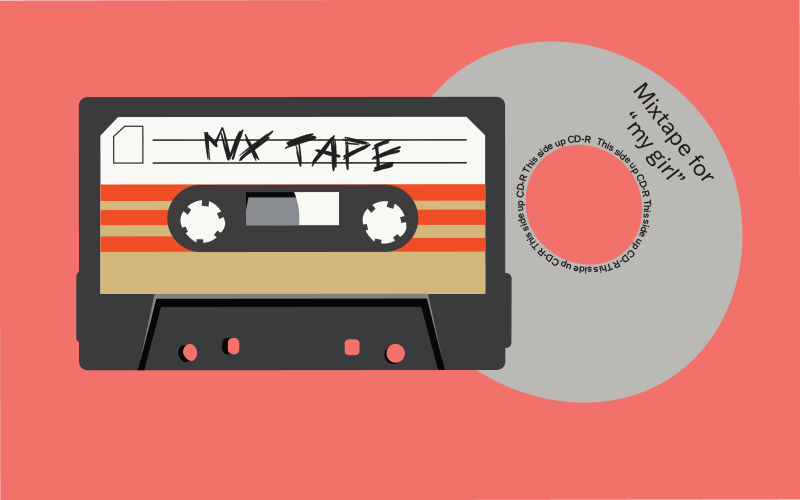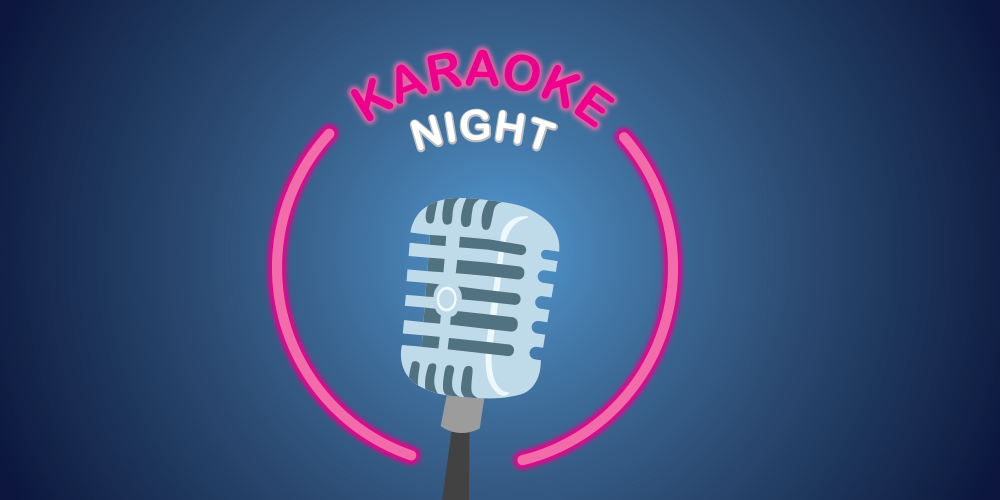It is the summer of 2006, and I am at the Karaoke Kid in Madison, Wisconsin, being serenaded by my boyfriend, H.D., and his new Vietnamese language summer school friends, Sam and Trung. Sam is half Vietnamese, half white, and 100% Minneapolis hipster. He is approaching his mid-30s, loves jazz on vinyl, and has an ex-wife. Trung is extremely short, but buff, favors ’90s R&B, and is 100% Southern Californian Vietnamese. He has a Canadian girlfriend with a credit card debt problem and is writing his dissertation on Vietnamese identity in Westminster, California. The song the trio performed that night, for what felt like the longest three minutes of my life, was “My Girl” by The Temptations. Little did I know at the time, while I smiled and sipped my light beer through clenched teeth, that this performance would alter my relationship to the song forever.

According to music therapists, music has the unique power to bring back memories far earlier than anything else, but the memories we associate with specific songs are not fixed. They can be recoded, such that good memories can be replaced with bad ones, and bad ones can be replaced with good ones. Music’s ability to function as a dynamic locus of emotion helps to explain why for the past 15 years, I reflexively recoil every time the song “My Girl” happens to come on the radio. The unmistakable opening guitar lick sends me right back to that wobbly high-top table at the Karaoke Kid when I was just 23 and on the cusp of my third year of English graduate school. Prior to that night, the song warmly recalled my childhood in San Jose. My Girl, starring Macaulay Culkin and Anna Chlumsky, was the first movie I ever saw in the theaters. My two older sisters and I asked my dad if he would drop us off at the Oakridge Mall Theater, and to our surprise, he said yes and gave us the 12 dollars we would need for the three matinee tickets. We loved the movie and all cried at the end when Vada, the titular “girl,” reads the elegy she writes for Culkin’s Thomas J. who dies from an allergic reaction to bee stings he receives in an attempt to recover a cherished mood ring Vada has lost in the woods. While his death is tragic, it is redeemed by our knowledge of the song, “My Girl,” which suggests that his passing is not accidental, but the consequence of nature’s jealousy over the depths of love he feels for Vada. Like the song says, “I’ve got so much honey, the bees envy me.”
For the longest time, I thought the karaoke performance of “My Girl” was cringeworthy because it was three dorky Vietnamese guys, one in a newsboy hat at that, singing a Motown classic. I told myself it was surely the disparity between this trio of Vietnamese summer school students in cargo shorts and t-shirts, and my image of The Temptations, with their matching suits and slick, choreographed dance moves, that caused me discomfort. I’ve come to realize, however, that anything anyone sings at an American karaoke bar is going to appear inevitably disparate or incongruent. American karaoke is already always a form of reenactment where the average American, with a below-average voice, performs the role of pop star, usually with a comic and/or ironic flourish. But the Vietnamese karaoke I grew up with, which can be found in Vietnam, or reverberating off the walls of any given Vietnamese household in the United States, is remarkably unstudied and bereft of these layers of self-consciousness. When I think of my aunties from Long Beach singing a heavily accented “Killing Me Softly,” a Vietnamese karaoke classic, while crowded together on their leather living room couch, I don’t cringe. In fact, my heart warms, as it once did when I heard “My Girl,” for this artless expression of love for song and communion.
If some form of latent Asian shame or antipathy towards karaoke was not to blame, then why does this song, which Wikipedia describes as an “unrestrained expression of male joy,” still make me so sad? It has taken me 15 years, during which time I married H.D., divorced him, and remarried, to develop a new theory about the feelings that still bubble up for me every time I hear that song. My discomfort had nothing to do with my own or my ex-husband’s Vietnameseness, but it did have everything to do with reenactment. Specifically, it had to do with what “My Girl” was allowing my ex-husband to reenact for me, for his new friends, and perhaps even for himself, in the summer of 2006 and beyond.
“My Girl” is a song about how the presence of a woman in a man’s life can transform his relationship to the natural world of clouds, birds and bees, as well as his relationship to the manmade world of money, fortune and fame. My ex-husband, who once told me that nature was his God, and whose entire existence was wracked by his fear that he might never fulfill his dream of becoming a well-respected poet and critic, was not the man in this song. Though he looked directly into my eyes while he belted out “My girl, my girl, my girl,” I was neither his “girl” (girlfriend, sure) nor his muse. As we both learned through the span of our ten-year relationship, simply repeating or reenacting something again and again cannot make it so. In fact, reenactment is what prevented my ex-husband and me from moving through time, even though our relationship eventually did.
Though my ex-husband is a poet, he never once wrote me a love poem during our relationship. This, and the fact that I never once saw him cry, were the two incongruities that most disturbed my romantic idea of what I thought it would be like to date a poet. It’s true that after I mentioned at least a half-dozen times that I’d really love for him to write a poem for me, he printed out one that he had written in college about Walter Benjamin’s “Arcades Project,” and added the dedication, “for Jeanette.” As a Shakespearean scholar, belief in the power of poetry to transcend the subjective trappings of time is an occupational hazard, and so I allowed myself to be flattered by the gesture, even though I knew deep down that H.D. was no Shakespeare, and that it was the printout, and not the poem itself, that was “for” me. The anniversary gift was simply a reenactment of ponderous feelings he once had, perhaps for Benjamin’s genius itself, which he encountered in his first critical theory course, or perhaps for that other Vietnamese girl from California he pined after in college, but who broke his heart by telling him he was not real boyfriend material.
My ex-husband’s tendency towards reenactment, and towards music as a preferred means of reenactment, was foreshadowed the morning after our very first kiss in February 2005 when he silently left a CD mixtape he had just made for me at my apartment door. The first song was The Velvet Underground’s “Sunday Morning” because it was literally Sunday morning. Because I am from California, there was also Billy Bragg and Wilco’s “California Stars,” and The Thrills’ “Big Sur.” Because we had just kissed for the first time, there was Louis Jordan’s “Knock Me a Kiss” and Olu Dara’s “Your Lips.” Though there is no way he nor I could know at the time that our first kiss would eventually lead to a six-year courtship that would lead to a four-year marriage that would eventually end in divorce; the mixtape was his way of inviting me to reenact the excitement of that first kiss and the first impressions we had of one another whenever I wanted. We were not yet in love, but the songs approximated a mood of love that I could and would replay again and again for years to come when we lived apart and I missed him and the people we were when we first met.

What I wanted from our relationship was to be my ex-husband’s “girl,” loved in a way that could inspire envy, a love poem addressed to me, and only me, and a marriage that built on the feelings of that first kiss over and over again, not one that was stuck in time like Lou Reed’s refrain on “Sunday Morning.” What I settled for instead was a recycled poem that was far less moving than the 11-year-old Vada’s, a cringeworthy reenactment of “My Girl” that spoiled the song for me forever, and a husband who clung to the freedom from responsibility that defined that night at the Karaoke Kid when he was just a grad student and all he had to do to prove his love was mouth the words that appeared effortlessly before him on the screen.
The rest of our love story is predictable and probably trite for anyone who has been in a long-term relationship with a Ph.D. student or an artist. When I was approaching my mid-30s, I wanted to put down roots and start a family. My ex-husband, who seemed to defy the laws of physics by moving backward through time at the exact same rate I was moving forward, did not. He wanted to quit the tenure track job he held in the English department at the same small liberal arts college he had attended years ago, apply for creative writing fellowships, and move across the country to live in a cramped Berkeley apartment like his poet friend Nat had just done. Time, who rather fittingly is almost always personified as male, was on his side, not mine, and so we ended things.
Shortly after our divorce was finalized in 2016, my ex-husband started dating a younger Shakespearean scholar who I knew from the annual academic conference we both ritually attended. I was traveling for the holidays and had just touched down for a layover in Las Vegas when I received an email from H.D., subject heading: (no subject). It read:
Dear Jeanette,
I hope this finds you doing well. There’s something I want to tell you because it affects not only me.
The Shakespearean in my department and I are in a committed relationship, which while being a happy one, is complicated by the fact that we both have pasts we’re learning to talk about. Mine significantly involves having been married to you, someone with whom she shares the same professional circles. I know she respects and admires you, and she regrets that her professional life is affected by her personal one in this way, as you will likely see each other at conferences and such. Perhaps you’ll feel the same way.
Please understand my reason for writing. I am wishing you all the best in the present and for the future.
And you may or may not have heard, I live in Iowa City now.
Take care,
H.D.
As he and I were no longer communicating at this point, and the 120 miles between Des Moines and Iowa City now ensured that we’d never run into one another at the same coffee shop or co-op grocery store, I positively did not understand why he thought I needed this information that just as well could have remained concealed from me. But much like my feelings about “My Girl,” I think I finally may have arrived at some conclusions. Was his dating another Shakespearean another form of reenactment? Maybe. Was his awkward regret-to-inform-you style email, which I could imagine his girlfriend dictating to him while standing over his shoulder as he typed her words directly into his laptop, an attempt to absolve himself of responsibility? Almost certainly.
With the wedding of reenactment and (ir)responsibility on my mind, I recently Googled my ex-husband and his girlfriend to see if they had gotten married, or if their courtship would be as prolonged as ours was. While I found no wedding website or gift registry, I did come across his acknowledgment to her in his first book of poetry: “For your love and infinite variety.” As any Shakespeare scholar would, I recognized the line from Shakespeare’s description of Cleopatra, but I also recognized it from a Cindy Sherman postcard that my ex-husband bought for me from the MOMA in 2012. On the backside of the self-portrait of Sherman, who is 27 at the time but dressed as a schoolgirl in a pleated tartan skirt and white polo, he writes, “She has infinite variety like someone I know.” •




